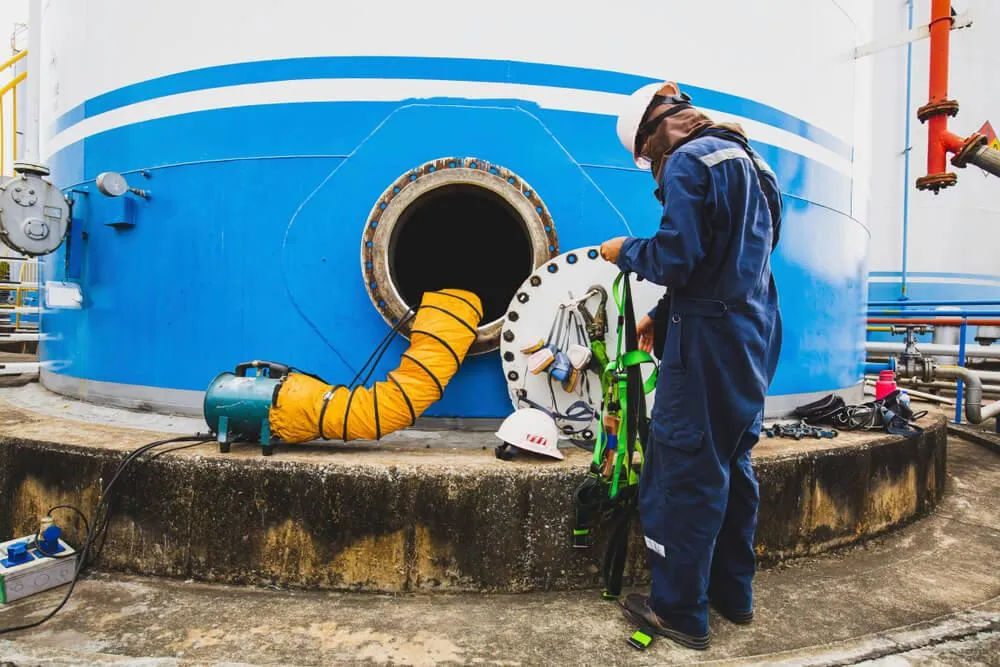
Choosing the right confined space equipment can be the difference between life and death
Confined spaces present workers with numerous opportunities for injury and even death. From 2011 to 2018, 1,030 occupational workers died from injuries that involved a confined space. There are many different types of confined spaces such as manholes, water wells, maintenance tunnels, silos and more. Each confined space setting requires different tools. This is why choosing the right confined space equipment is vital for the safety of your confined space workers.
Types of equipment heavy industry workers should be
using in confined spaces for normal work tasks and/or
rescuing trapped workers
OSHA maintains that heavy industries must supply their workers with the right equipment. Your workers must also know the equipment’s relationship to the specific confined space. OSHA also requires that this equipment is relevant to safe entry and rescue. Here are five types of confined space equipment that are OSHA compliant:
Tripods — Tripods are used for a non-entry rescue. Tripods are typically 9 feet or higher. This is so that the rescuer has access to the whole area of the entry. The three legs of the tripods supply this tall structure with sturdy, stable support.
Rescue harnesses — Rescue harnesses are used to retrieve a victim from a confined space. The employee is secured to a dorsal string. The dorsal string is attached to a self-retractable lanyard to lower it into the space and then raise the employee back out. It is important to note that this method (like most methods) cannot be used in all rescue situations. If the employee is unconscious, a malleable string may allow the victim’s head to hit the walls of the space.
Self-retractable lanyards — Self-retractable lanyards are short lengths of rope, webbing, or cable that can raise and lower victim-employees that are attached to a rescue harness. Self-retractable lanyards can not only elevate and lower these employees but can also be useful for fall protection.
Winches — Winches can be used for both confined space rescue and normal entry. They can raise and lower workers. However practical this may be, it has its limits, like most types of equipment. Winches cannot arrest a fall, for instance.
SRLs — Standing for self-retracting lifeline, SRLs should be paired with winches in case the winch fails. This is because SRLs are capable of arresting falls. These variable-length devices can be essential for ensuring the safety of your workers.
Find out how Basin Safety can supply you with confined
space equipment and knowledge of such tools
Basin safety is prolific in providing companies with confined space services. We offer many workplace training programs, including ones that confined space workers can benefit from. We also provide companies with a variety of reliable confined space equipment that satisfies OSHA’s requirements.
Contact us today to learn more about the many training programs we offer or to learn more about all our field services.
Archives
Categories
Benzene Testing
Bloodborne Pathogens
Breathing Air Systems
Certification Process
Confined Space Attendants
Confined Spaces
Construction Equipment Operators
Electrical
Environmental Compliance
Excavation and Trenching
Fire Extinguisher Training
Forklift Operator
Hazcom Workplace Safety
HAZWOPER
Hearing Protection Training
Heavy Equipment
Hydrogen Sulfide
Lone Worker
Lone Worker Solutions App
Monitoring
Oil and Gas
Oil Drilling
Online Training Confined Spaces
Permit-required
PPE
Radiation Safety
Rescue Equipment
Rescue Team
Safety Consultants
Safety Devices
Safety Tracking
Safety Training
Site Inspections
Training 1
Training 2
Training 3
Training 4
Training 5
Uncategorized
Virtual Access to Safety Data
Waste Haulers
Confined Space Rescue
Mental Health
VISIT US
202 48th Ave SW, Williston, ND 58801
2740 Sims St. Suite B Dickinson, ND 58601
(701) 572-8140

BASIN SAFETY CONSULTING CORPORATION
Basin Safety believes in shared excellence. We are accountable to our core values:
● Pioneering Excellence Everyday
● Supporting each other to put customers first
● Asking the right questions, to ensure the greatest results.
Basin Safety Consulting © 2025. All rights reserved.
Powered By Upleveled Strategies

BASIN SAFETY CONSULTING CORPORATION
Basin Safety believes in shared excellence. We are accountable to our core values:
● Pioneering Excellence Everyday
● Supporting each other to put customers first
● Asking the right questions, to ensure the greatest results.
VISIT US
202 48th Ave SW, Williston, ND 58801
2740 Sims St. Suite B Dickinson, ND 58601
(701) 572-8140
Basin Safety Consulting © 2025. All rights reserved.
Powered By Upleveled Strategies
